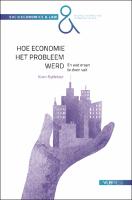Hoe economie het probleem werd
En wat eraan te doen valt
| dc.contributor.author | Byttebier, Koen | |
| dc.date.accessioned | 2022-09-13T09:42:49Z | |
| dc.date.available | 2022-09-13T09:42:49Z | |
| dc.date.issued | 2022 | |
| dc.identifier.uri | https://library.oapen.org/handle/20.500.12657/58186 | |
| dc.description.abstract | The legal systems that shape capitalist societies worldwide contribute to a number of fundamental social problems. An ever-growing public and private debt, environmental pollution, an increasing polarization between rich and poor, and a globally unjust fiscal and financial system are examples of this. from. The capitalist system itself does not address these problems. However, the main legal building blocks of the capitalist socio-economic system are remarkably simple, namely money and the way in which it is created, the (capital) company form and the (neo)liberal state organization that wants to make the markets as free as possible. In How Economics Became the Problem (and What to Do About It), the author, as a specialist in the field, provides a critical analysis of capitalist economics and provides insights into how, for the benefit of our societies, we be able to use the prevailing legal instruments completely differently. The book is the Dutch version of the original English version entitled How Economics Became the Problem. An urgent call to legal action. The Russian translation of the book will be published in 2021. A Chinese version of the book is currently in press. | en_US |
| dc.language | Dutch | en_US |
| dc.relation.ispartofseries | Socioeconomics & law | en_US |
| dc.subject.classification | thema EDItEUR::K Economics, Finance, Business and Management | en_US |
| dc.subject.other | sociology; Economy; law; capitalism; | en_US |
| dc.title | Hoe economie het probleem werd | en_US |
| dc.title.alternative | En wat eraan te doen valt | en_US |
| dc.type | book | |
| oapen.abstract.otherlanguage | De rechtssystemen die de kapitalistische samenlevingen wereldwijd vorm geven, dragen bij tot een aantal fundamentele maatschappelijke problemen. Een almaar groeiende openbare en particuliere schuld, de milieuvervuiling, een toenemende polarisatie tussen rijk en arm, en een wereldwijd onrechtvaardig fiscaal en financieel systeem zijn daar voorbeelden van. Het kapitalistische systeem zelf pakt deze problemen niet aan. Nochtans zijn de belangrijkste juridische bouwstenen van het kapitalistische sociaaleconomische systeem opmerkelijk eenvoudig, namelijk geld en de manier waarop het wordt gecreëerd, de (kapitaal)vennootschapsvorm en de (neo)liberale staatsorganisatie die de markten zo vrij mogelijk wil maken. In Hoe economie het probleem werd (en wat eraan te doen valt) geeft de auteur als specialist ter zake een kritische analyse van de kapitalistische economie en geeft hij inzichten in hoe we, ten bate van onze samenlevingen, de heersende juridische instrumenten volledig anders kunnen inzetten. Het boek vormt de Nederlandse versie van de oorspronkelijke Engelse versie met als titel How Economics Became the Problem. An urgent call to legal action. In 2021 verscheen de Russische vertaling van het boek. Een Chinese versie van het boek is momenteel ter perse. | en_US |
| oapen.identifier.doi | 10.46944/9789461173591 | en_US |
| oapen.relation.isPublishedBy | 5cae5a70-e73a-4f54-96c8-533084e04e50 | en_US |
| oapen.relation.isbn | 9789461173010 | en_US |
| oapen.relation.isbn | 9789461173102 | en_US |
| oapen.series.number | 2 | en_US |
| oapen.pages | 154 | en_US |
| oapen.place.publication | Brussel | en_US |

